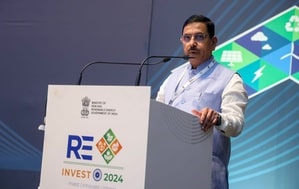To boost India’s position in the field of sustainable development and renewable energy, Union Minister of New and Renewable Energy, Pralhad Joshi, will embark on a three-day tour to Germany from October 6, the government said on Saturday.
The minister is set to attend the ‘Hamburg Sustainability Conference’ from October 7-8, and will hold a series of bilateral meetings to boost cooperation in sustainable development, Green Hydrogen, low-cost finance and renewable energy value chain components.
According to the Ministry of New and Renewable Energy, the visit will elevate India-Germany relations to create business opportunities and accelerate the expansion of renewable energy in India and worldwide.
The visit will also underscore India’s commitment to sustainable development and renewable energy, fostering international partnerships to address global challenges, the ministry added.
Prime Minister Narendra Modi has laid special emphasis on the India-Germany bilateral relations. The Inter-Governmental Consultations between the leaders of India and Germany is scheduled in the country this month.
The country had achieved its nationally determined contribution (NDC) target of 40 per cent cumulative electric power installed capacity from non-fossil fuel-based energy sources by 2030 in 2021 itself, nine years ahead of schedule.
India is on track to meet its NDC goal of achieving 50 per cent cumulative electric power installed capacity from non-fossil fuel sources by 2030.
The Union Cabinet, chaired by PM Modi, has approved India to join the International Energy Efficiency Hub by signing the Letter of Intent, as the country aims to achieve net-zero carbon emissions by 2070, focusing on renewable energy expansion, and plans to reach 500 GW of non-fossil fuel energy capacity by 2030.
The International Energy Efficiency Hub is a global platform dedicated to fostering collaboration and promoting energy efficiency worldwide. The move solidifies India's commitment to sustainable development and aligns with its efforts to reduce greenhouse gas emissions, a Cabinet communique said.




Mistake that benefits no one: World leaders react to Trump's 'reciprocal tariffs'
As US President Donald Trump signed an executive order on the so-called "reciprocal tariffs," the world reacted sharply against the decision, with some calling it a "mistake that benefits no one" while others called it a violation of Washington's obligations under the World Trade Organization (WTO).
Indian pharmaceutical exports get reprieve from Trump’s reciprocal tariffs
Because of the importance of India’s pharmaceuticals to US healthcare, those exports will get a reprieve from President Donald Trump’s reciprocal tariffs, according to the White House.
India stands less impacted by Trump tariffs than global peers: Industry
As US President Donald Trump announced reciprocal tariffs on dozens of countries, including India, industry experts said on Thursday that it appears India's export competitiveness to the US market stands far less impacted on a relative basis compared to global peers.
IAF pilot killed, another critical as Jaguar fighter jet crashes in Gujarat
An Indian Air Force (IAF) pilot lost his life, while another sustained critical injuries after their two-seater Jaguar fighter jet crashed near Gujarat's Jamnagar Airfield, the IAF confirmed on Thursday.
PM Modi emplanes for Thailand; to attend BIMSTEC summit
Prime Minister Narendra Modi on Thursday emplaned for Thailand on a state visit to attend the 6th BIMSTEC Summit, with his visit also set to bolster bilateral relations between New Delhi and Bangkok.
Tripura CM stresses promoting NE states' potential to attract investment
Tripura Chief Minister Manik Saha on Wednesday said that the development of the communication process and system has generated a lot of investment potential, and therefore, more emphasis should be placed on promotion to attract investors in all the northeastern states.
Tripura has 94,723 Lakhpati Didis; 93,425 women to get similar status soon: Minister
Among the 4,75,582 Self Help Group (SHGs) members in Tripura, 94,723 women emerged as ‘Lakhpati Didis’ through their engagement in various enterprising units and 93,425 more women would be ‘Lakhpati Didis’ soon, Social Welfare and Labour Minister Tinku Roy said.
Bhavan’s Little Learners celebrate annual programme
The Bhavan’s Little Learners, Bordowali celebrated annual programme and organised prize distribution ceremony here at Agartala Rabindra Satabarshiki Bhavan on Wednesday.